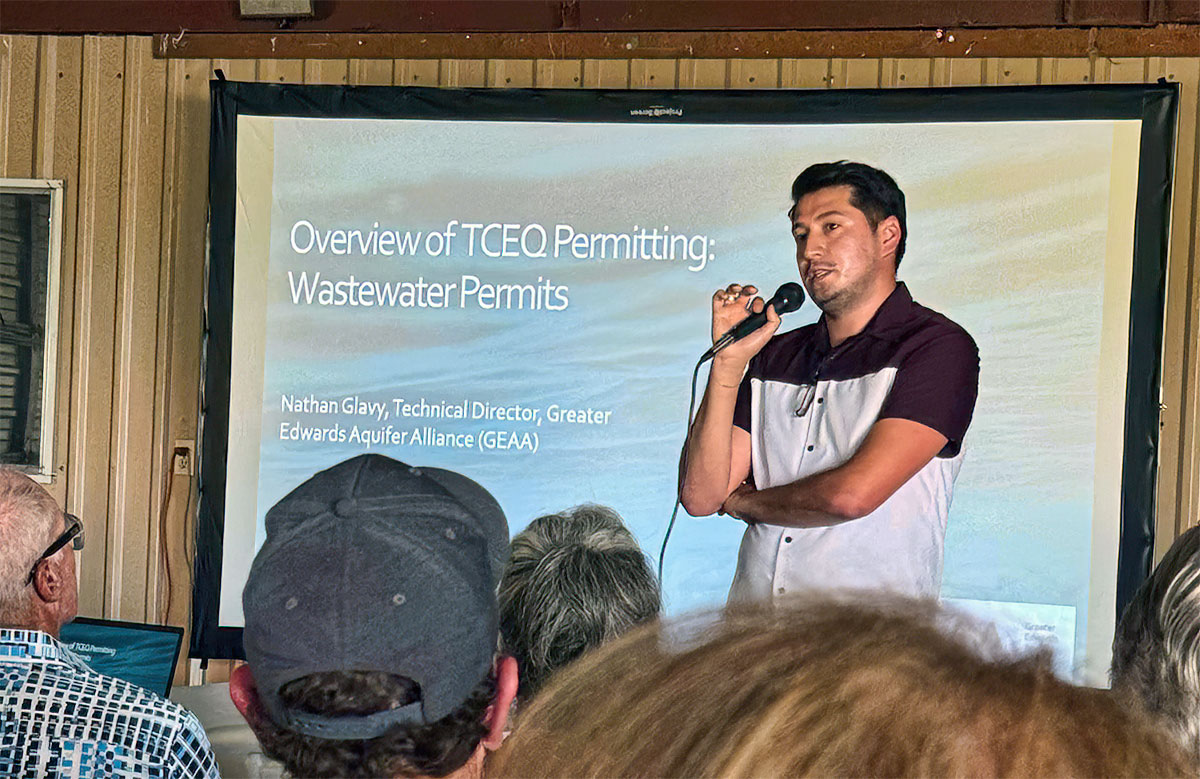Comal County residents breathed a sigh of relief in March when The Texas Water Company (TWC) announced the temporary suspension of new service commitments for nine proposed housing developments in Comal County, citing the need to prioritize existing customers during the ongoing drought.
Broken Cedar Ranch, Lennar’s proposed 850-home development in the FM 484/FM 306 area north of Canyon Lake near Fischer, was the only development TWC named in its March 19 statement.
Nearby residents are wondering just how temporary the reprieve will prove.
Leesa Brieger, a Fischer resident and member of Fischer Store Schoolhouse Community Center, said they scheduled a town hall for 5:30 p.m. Wednesday, April 30, at the Fischer Store Schoolhouse, located at the intersection of RM 32 and FM 484, to learn about the project’s permitting process and what a coalition of citizens can do to stop the development.
The public is invited to attend.
Nathan Glavy, technical director for the nonprofit Greater Edwards Aquifer Alliance (GEAA), will discuss the next steps in the regulatory process.
He said Lennar’s plans to build four houses per acre on 230 acres might be on hold, but the wastewater permit it filed with the Texas Commission on Environmental Quality (TCEQ) is still active on the commission’s website.
In fact, TCEQ is in the process of doing a “technical review” of the completed application, which would allow Lennar to discharge 600,000 gallons of treated wastewater per day into Canyon Lake after TWC rescinds its temporary hold.
“We can’t throw up our hands in the air saying it’s done, we’ve won this, because the application is still listed as active,” Glavy said.
TWC raised more questions than it answered in its original statement, which attracted a lot of attention from other counties in Central and South Central Texas because it was the first of its kind from a water provider, he said.
The utility did not provide details about the length of the suspension, only saying the decision allowed the company to remain in compliance with state regulatory requirements for system redundancy and resiliency, and to maintain a reliable, sustainable water infrastructure.
Temporarily on hold are five projects in Precinct 1 totaling 2,334 lots, two projects in Precinct 2 totaling 638 lots, and two projects in Precinct 4 — including Broken Cedar Ranch — totaling 1,210 lots, according to Precinct 4 Commissioner Jen Crownover.
All that is publicly known about TWC’s future ability to supply water to customers is that the water utility secured 6,000 acre-feet of new water supply in the FM 1863 area of Comal County for delivery by 2026, and plans to bring new infrastructure online over the next two years.
What most likely triggered TWC’s suspension is the utility could not guarantee its ability to supply residents with water in the long term, Glavy said.
Every three years, TWC (formerly known as SJWTX and Canyon Lake Water Service Company), New Braunfels Utilities, Crystal Clear and San Antonio Water System (SAWS) are legally required to present Comal County commissioners with detailed reports about water availability for the next 20 years.
In December 2022, then-county Engineer Tom Hegseth told commissioners these reports are a “big deal.”
“This allows the county to approve subdivisions that are connecting to these utilities during the next three years, and as these utilities grow and their service areas get larger and their demands get larger, we then reevaluate their capability to serve these proposed subdivisions,” he said.
In a 2022 report submitted to commissioners, CLWSC/TWC described its water supply as diverse.
“The water supply is shown to be in excess of demand over the next 20 years,” the utility said. “This excess will allow for future growth and provide redundancy during emergency conditions. CLWSC has the experience and resources to meet the projected demand within its service area over the next 20 years.”
But the worsening drought and relentless development have changed that equation.
The Canyon Lake area is now in Drought Stage IV, and the Guadalupe-Blanco River Authority (GBRA), which sells water from Canyon Lake, said the severity of the drought now exceeds that of the 1950s drought previously used as a benchmark.
Glavy said it’s possible TWC told the county it can no longer guarantee supplies.
“They could not meet that 20-year mark to have a water supply available for these developments,” he said.
Residents can get ready for what comes next, though.
Lennar’s immediate workarounds include forming a Municipal Utility District (MUD), which won’t fly either since MUDs are also subject to 20-year checkpoints, or drilling private wells, which is also not a viable solution due to platting requirements that would reduce the number of homes allowed per acre.
Longer term, the developer simply can wait for TWC to rescind its temporary hold on developments.
“It’s a big win to have this type of rural water provider put a stop to granting permits,” Glavy said, but the win isn’t permanent.
Residents’ best option may be to challenge Lennar’s wastewater permit application by requesting public meetings through Republican state Sen. Donna Campbell, SD-25, and Republican state Rep. Carrie Isaac, HD-73.
Glavy said he will outline other possible steps during Wednesday’s presentation.





Any more town hall meetings set for June or July 2025? I’m spreading this to everyone I know but we need more people aware of this urgent matter.